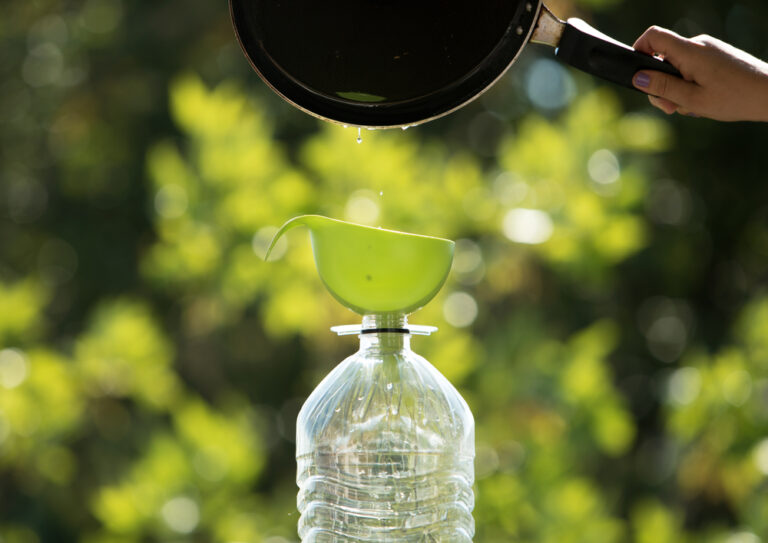You’ve probably been told many times that it’s hazardous to your pipes if you pour cooking fat and grease down the sink drain, but how many times have you been tempted to dump the bacon fat from your frying pan into the sink instead of disposing of it properly?
This may seem like an innocent action but the consequences can be pricey when it comes to clearing fat and grease clogs from your drains.
Before you fry up some delicious eats in your kitchen, check out these reasons why you shouldn’t pour your grease down the drain and what to do with it instead.
Why is Grease Bad For Drains?
Even though grease is a liquid, it quickly solidifies as soon as it cools off just like candle wax. When this happens in your pipes, the grease acts as a sticky trap for debris and other forms of gunk that make their way down your drain. Over time, this blockage will grow and clog the pipes or slow the drain.
Not only that but grease and fat can also cause damage to local sewer systems and septic tanks. These clogs can lead to thousands of dollars worth of damage! For this reason alone, it’s important to properly dispose of fats and grease in your Edmonton home.
The Best Ways to Dispose of Cooking Oil and Grease
Before we talk about how to properly dispose of cooking oil and grease, it’s important to differentiate between the two:
Grease
Grease occurs as a byproduct of cooking certain foods. Bacon, for example, creates grease in the pan as it cooks.
If the grease is still hot, pour it into a can or other dedicated grease jar (mason jars work well, too). When the jar fills up, scoop the grease into the trash or throw out the entire can. You can also wait until the grease solidifies in the pan and wipe it out with paper towels.
Cooking Oil
Cooking oils are substances you add to food to help it cook, such as deep frying french fries in vegetable or canola oil, or using olive oil for baking.
To get rid of cooking oil, let it cool off before you dispose of it. If there’s less than a cup, simply pour it into the garbage on top of some paper towel. If there are large amounts of oil, you can simply pour it into a clean container and reuse it the next time you’re frying – or throw it out like cooking grease.
There are also ways you can recycle cooking oil to cut down on waste and save money!
How to Recycle Cooking Oil
As long as your cooking oil was not heated past the smoking point, you can use it again for deep frying, pan-frying, sautéing, and baking.
Simply strain the semi-warm oil using a cheesecloth or coffee filter to remove any food particles and store it in an air-tight container. Before you use your cooking oil again, make sure to give it a sniff to make sure it hasn’t gone rancid.
You may also have the option of dropping your cooking oil off at a local collection site. Some cities recycle oil to keep these substances out of landfills. Just prepare it the same way you would if you were going to reuse it at home.
How Not to Dispose of Fats and Grease
Apart from the obvious – that is, not to pour fats and grease down your drains – there are other methods you should avoid when disposing of these substances.
First of all, do not dump fats and grease outside. When you pour oil on the ground, it will end up in your sewer system and cause clogs anyway. Plus, oils and grease can cause issues for local wildlife when left outside.
You should also avoid disposing of cooking oil in your compost pile. Small amounts of vegetable-based oils may be okay but larger amounts will cause issues with airflow and moisture, thus ruining your fertilizer. Animals fats should definitely be kept out of your compost pile. The smell will attract vermin as well as potentially cause your compost to become unhealthy.
How to Clear Fats and Grease From Your Drains
Sometimes it happens by accident that fats and grease make their way to your drains. When this happens, it’s important to act immediately to prevent any messy and expensive clogs in your home’s plumbing system.
Start by running the water from your faucet as hot as you can and pour a gallon of boiling water down the drain. As the water is running, squirt some liquid dish soap down there too. This may help re-liquefy the grease and work it through the pipes. Alternatively, try pouring baking soda and white vinegar down the drain to clear the grease away before it solidifies. You can also use an enzyme-based drain cleaner to neutralize the grease.
If neither of these tactics works, try using a plunger to dislodge the grease clog. In the end, if nothing helps, it’s time to call in a professional.
Hiring a Professional Drain Cleaner
When it comes to plumbing tools, most homeowners don’t own more than a plunger and a wrench. While these are often enough to address a clogged drain caused by fats and grease, it may be necessary to hire a professional drain cleaner.
Our team of licensed plumbers at Peak Sewers has access to all kinds of specialized tools! These include sink augers for cleaning drains and different styled snakes for different needs – even ones with cameras! Not only do we have the tools, but we also have the expertise to help you clear out clogs caused by cooking grease and fats.
Ready to get unclogged? Contact Peak Sewer today!

